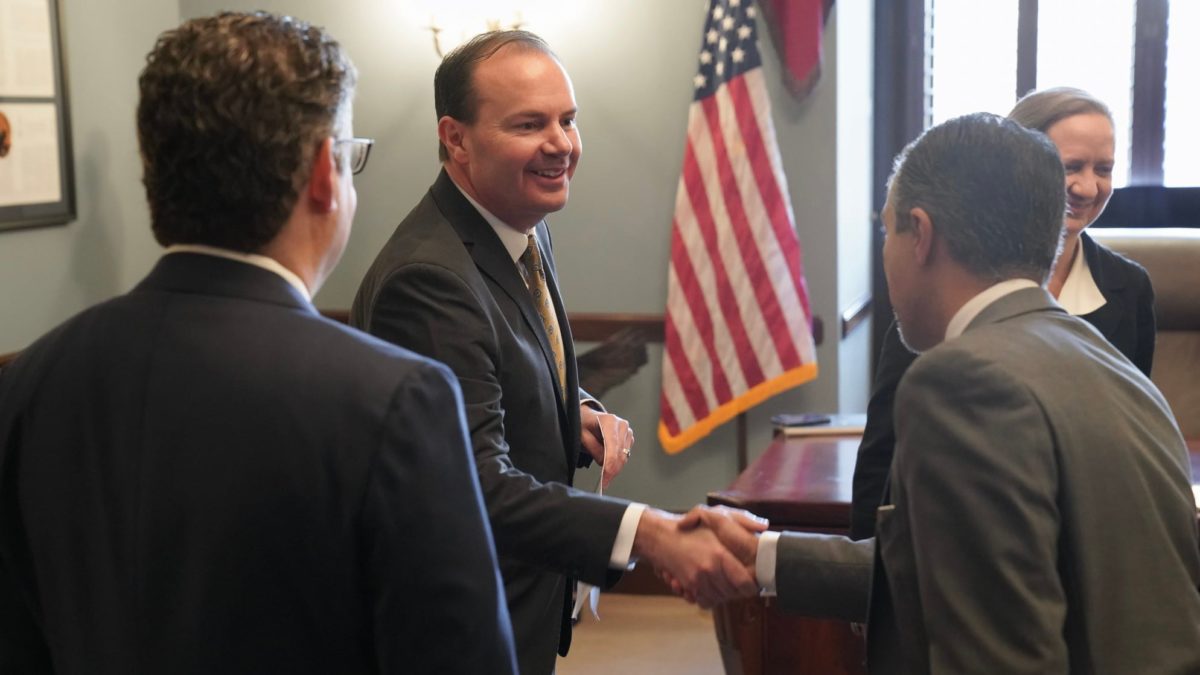Politics
Utah Sen. Mike Lee prepares for toughest reelection fight yet

Republican Sen. Mike Lee may have been an upstart when he toppled a longtime senator in a tea party wave more than a decade ago, but in the dozen years since he’s managed to avoid a serious challenge in deeply conservative Utah. Photo: Senator Mike Lee
SALT LAKE CITY — Republican Sen. Mike Lee may have been an upstart when he toppled a longtime senator in a tea party wave more than a decade ago, but in the dozen years since he’s managed to avoid a serious challenge in deeply conservative Utah.
That’s changing this year as he faces two GOP challengers and a newly empowered independent who’s been backed by the Democrats. While Lee still has a solid base of support in Utah, the contest is shaping up to be his toughest reelection campaign yet as newly released text messages raise questions about his early involvement in efforts to overturn the results of the 2020 election.
The trove of messages show Lee promoted legally dubious schemes to keep then-President Donald Trump in power, before he shifted course and backed away. The text messages were revealed just days before Utah Democrats took the unprecedented step of passing over a Senate candidate of their own party and instead endorsing an independent, former long-shot presidential candidate Evan McMullin.
The recent turn of events illustrate Lee’s potential vulnerability in the rare Republican state where many conservative voters still harbor concerns about the former president. The release of the messages could test voters’ tolerance for efforts to overturn the 2020 election and heighten Lee’s delicate balancing act as he tries to fend off a pair of primary challengers and an independent Trump critic who has forged an unlikely alliance with Democrats to bring him down.
“Our strategy is, very plainly, to find common ground between these groups and bring them together in common cause to replace Mike Lee, defend our democratic republic and move the country forward,” McMullin said Thursday.
McMullin, a former CIA officer, captured 20% of the vote in Utah when he ran for president in 2016 — including a protest vote from Lee, who was then a Trump critic.
Lee has since become a staunch ally of the former president, and he trounced his Republican competition at a party nominating convention last weekend with about 71% of the vote.
But that audience is a small number of core party members who lean much further right than the rest of the Republican electorate in Utah.
The fact that 3 in 10 of the audience members at the convention were willing to cast their votes for someone else could point to trouble for Lee, said Chris Karpowitz, a political science professor at Brigham Young University.
Lee’s office did not comment on his reelection bid for this story.
Second-place finisher Becky Edwards, an ex-state lawmaker, mentioned Lee directly during her Saturday convention speech, critiquing his effectiveness and questioning his character. “I choose to vote out those who are loose with transparency and integrity,” she said.
She’ll be on the primary ballot in June, along with Ally Isom, a former high-ranking gubernatorial staffer who implored delegates to “reclaim our party and take back the country.”
Lee, for his part, focused on attacking President Joe Biden on inflation, immigration and guns. “The price to live in Joe Biden’s America is way, way too high,” he said to applause.
Like many other Republican politicians, including now-Sen. Mitt Romney of Utah, Lee was critical of Trump during the celebrity businessman’s first run for president in 2016. By 2020, however, Lee was a full-throated supporter, even once comparing Trump to Captain Moroni, a scriptural hero in The Church of Jesus Christ of Latter-day Saints.
That comparison didn’t land well for all members of the faith based in Utah, where the political culture is conservative but almost unfailingly polite and receptive on issues like immigration. Voters still harbor concerns about Trump-style politics.
The April 15 release of text messages obtained by the House panel investigating the Jan. 6 insurrection at the U.S. Capitol helped solidify Democratic voter Kirsten Healey’s opinion that a chance to unseat Lee was worth spurning a candidate in her own party for an independent — even one who doesn’t necessarily align with her views. “It was kind of a heartbreaking decision for me personally,” she said.
But Healey, a party delegate, said, “I think our country is so much on the cusp right now of keeping a strong democracy, that I think to keep Mike Lee as our senator is really dangerous right now.”
The senator’s core GOP supporters were unshaken. “He was working within the law,” said Jess Bradfield, a Republican who serves as Cache County clerk. “I think people understand, you text things to people that don’t always sound the greatest.”
Others voters aren’t so sure.
The texts aren’t a deciding factor for Republican Christy Jacobs, but she’s still ready to vote for someone else. She’s been disappointed by other moves Lee made, like voting against the creation of a national historic site at a former detainment camp for Japanese Americans in Colorado. While Lee’s office has said the vote reflects only his opposition to putting more land under federal control, to Jacobs it looks like political posturing.
“I don’t think he stands up for the right things,” she said. “I don’t like it when people put politics over getting things done.”
She’s deciding between Isom and Edwards in the primary but isn’t yet sure if she’d cast a ballot for an independent in the general election.
The presence of two challengers splitting the anti-Lee primary vote further heightens the chances Lee will win the GOP nomination. But he could emerge from that contest battered, with some moderates feeling open to voting for someone else.
If McMullin, who outraised Lee in the final quarter of 2021, manages to capture the wider Democratic vote, scoop up independents and sway some moderate Republicans, the unlikely coalition could put him over the top.
“He has to appeal across ideological lines to have any hope of winning,” Karpowitz said.
It’s a tricky proposition in a time of deep political division. A strong showing, however, could have a wider impact.
“It has implications across the political spectrum for how candidates other than movement conservatives could win, even in very Republican places,” Karpowitz said.



















